Michael Vaughan: 'I want people to realise what it’s like to be cancelled'
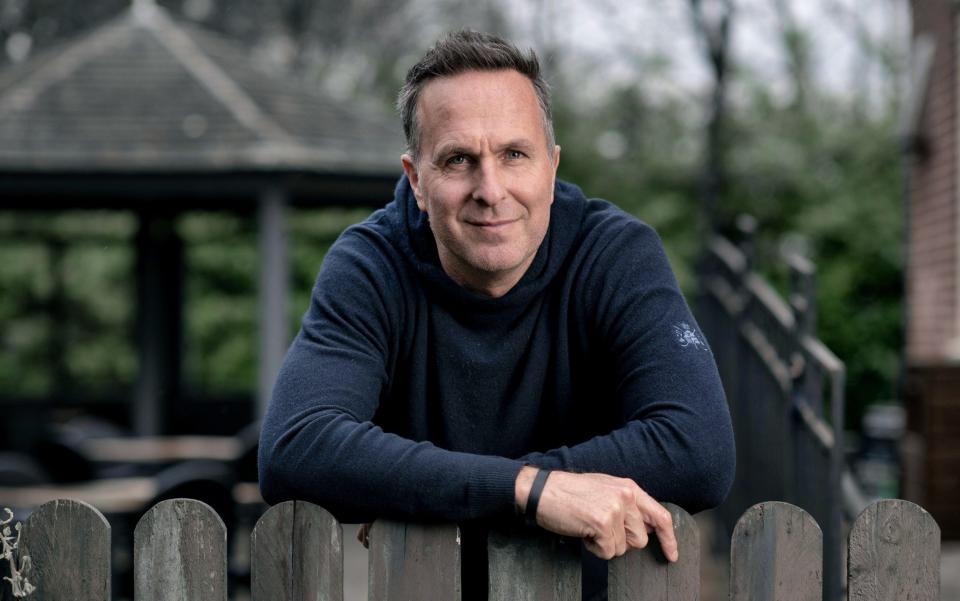
It is when he mentions his parents that the emotion engulfs him. We are familiar by now with images of Michael Vaughan as the Ashes-winning captain, as the poised and fluent broadcaster, but for one brief moment he looks utterly heartbroken, wrung-out by the torment of being publicly shamed for an alleged 14-year-old remark he insists he never said.
“I’ve been tough in front of the family, but I’ve had many moments on my own in my car, just crying,” he says. “It’s something I will always talk about, because it’s real. It’s a true story that you’re driving along and you see that it’s all crashing down.”
Nothing shatters him so much as the thought of the psychological toll suffered by his mother, Dee, and father, Graham.
“You realise that your mum and dad are old. They’ve only got a few years left. And I’m thinking, ‘My word, in their last years they’re going to be seeing their lad …’” He trails off, tapping the table a couple of times to stop the tears from flowing, to no avail. “That hit me hard,” he weeps. “My mum and dad.”
It is the end of Vaughan’s longest day. I meet him outside a pub in Wilmslow, where he pulls up in his black pick-up truck, fresh from a 400-mile round trip to Somerset to collect his son, Archie, from Millfield School for the Easter holidays. Here in the garden, where a glowering evening sky mirrors the bleakness of the ordeal we are here to discuss, his exhaustion is self-evident. He woke at 3am to pound the streets of this quiet Cheshire town alone, steeling himself for a morning that he knew would define the rest of his life.
“I got the steps in, at least,” he says, a little dry Yorkshire wit illuminating the gloom. “By 6am, I had already walked six miles.”
'I just burst out crying'
At 7.49am, as he headed down the Chelford Road en route to the M6, Vaughan’s telephone rang. It was his lawyer, Paul Lunt, informing him that he had been cleared of using racist language towards Azeem Rafiq, his former Yorkshire team-mate, at Trent Bridge on June 22 2009.
The relief washed over him like a flood tide. For two years he had put his life on pause, desperate to stop an avalanche of reputational damage on being accused of telling Rafiq and three other players of south Asian heritage: “There’s too many of you lot, we need to do something about that.” Now, after a four-day hearing, came the judgment of the Cricket Discipline Commission that, on the balance of probabilities, he said no such thing.
“I just burst out crying,” he reflects. “It has been months and months of thinking, ‘How am I in this position?’ I was sitting in the hearing asking myself, ‘What is this? We’re here about a word-against-word comment from 14 years ago. The England and Wales Cricket Board, the organisation I gave everything to for 17 years of my life, from the Under-17s through to the Test team, are trying to discredit me. How has it got to this?’”
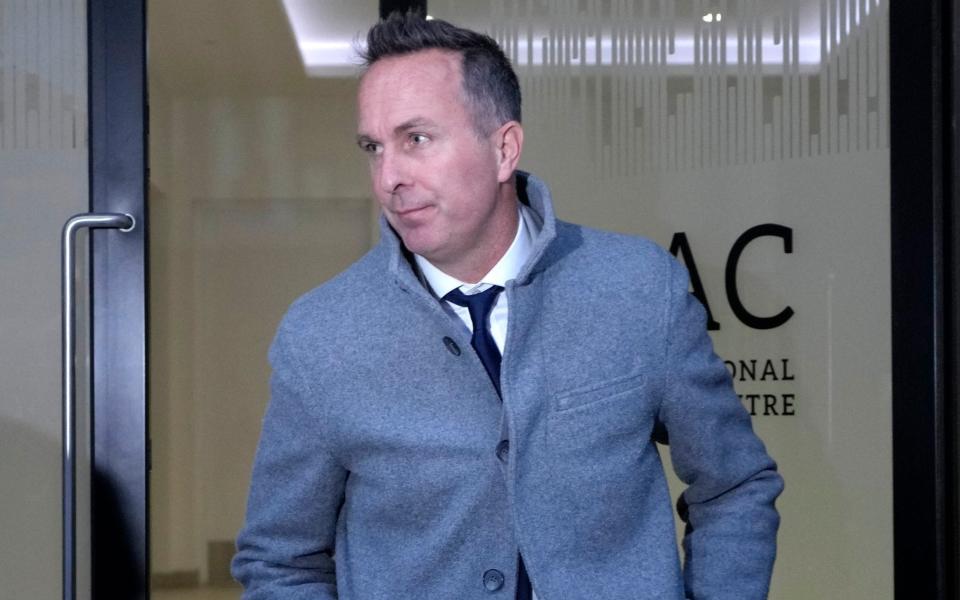
The fallout has encompassed far more than his own mental state. For the first time, Vaughan lays bare the turmoil wrought within his family, describing how his wife, Nichola, has been taking beta-blockers for 16 months to cope with the stress. “She has been continuously waking up in the middle of the night, crying her eyes out,” he says. “She knows how hard I have worked for 32 years, and she could see that it was falling apart.
“I got a sense people wanted to see the back of me. When I was walking the streets during the night, I genuinely was thinking, ‘I’ll have to do without English cricket. I’ll have to move overseas.’ I’ve been telling people that I’ve not been watching cricket, putting this screen up to suggest that I could do without it. But cricket is my life. It’s all I really know.”
'It's going to take time for us to recover'
Has he been able to impart, for the sake of those closest to him, any words of consolation? “I’ve tried to stay strong for them, to tell them not to worry. Even this morning I said to Nichola, ‘Even if it goes against us, it’ll be fine,’ knowing full well that it would not have been. But I had to put this thought in her head. She has struggled more than anybody I’ve seen. I’ve been around cricketers who have struggled with mental health, but never someone so close. She’s better today, but it’s going to take time. It’s going to take time for me to recover, too. I’m not asking for anyone to feel sorry for me at all. I just want people to realise that this is what you go through when you get cancelled.”
The very term “cancel culture” can sometimes seem crude shorthand for those who find themselves ostracised for words or deeds deemed as socially unacceptable. But to listen to Vaughan – drained by his treatment both in a botched ECB investigation, and in the court of public opinion – is to gain a piercing insight into its horrors.
“I can absolutely tell you that it’s real,” he says. “And it comes through social media. It’s so dangerous. You used to be innocent until proven guilty. You’re now guilty until proven innocent. Your life gets completely put on hold. Whatever the accusation thrown at you, people on social media just will not allow you to carry on with your life while it’s over your head.
"I’m not the man to change that. I haven’t got the strength at the minute. I hope that in time, people realise that it’s not a fair process when accusations hit somebody’s doorstep and they’re not allowed a proper process to clear their name before they get cancelled. People’s lives are getting stopped far too soon.”
His concern for his three children’s welfare is acute. Talulla, his eldest daughter, was in the midst of her A-levels when the Rafiq maelstrom first erupted. She has, her father argues, “done remarkably well to cope”. The realities for his youngest, Jemima, still at school, have been harsher.
“The little one has had huge anxiety problems. She’s a worrier. She can see that Dad’s on the phone all the time, that I’m having deep conversations, and she wants to hear things. She’s nosey, as most young kids are. And she has probably heard things over the past year that she shouldn’t have heard.”
Archie has followed him into cricket, joining Somerset’s academy in 2021. “He’s away, and he was a big concern of mine. He’s a great lad, trying to be a cricketer himself, and I was so fearful that what I had been accused of saying, if it had gone the wrong way, could affect him. It’s not just my immediate family, it’s my nieces, nephews. Everyone connected to me would have been linked to this situation.”
'It hurt hugely'
It was November 2021, when Vaughan first revealed he was named in the independent report into Rafiq’s claims of racial discrimination at Yorkshire, that marked the nadir. “My kids were getting direct messages, saying ‘Your dad’s a racist.’ That’s when I knew I was in a very difficult situation.”
Did the abuse fortify his resolve to fight back? “It didn’t, because at that stage I honestly never thought we would get to the stage of having a hearing. I thought it would all go away. I always tell my kids to be tough. So, I told them to ignore it. This is the hardest situation I’ve ever been in. I don’t want anyone else to go through the same experience.”
The ECB’s inquiry into Vaughan’s conduct on that fateful Nottingham day in 2009 was riddled with fundamental flaws. Under fierce cross-examination last month by his lead counsel, Christopher Stoner KC, Meena Botros, the governing body’s head of legal and integrity, admitted they had not spoken to the umpires officiating that afternoon, or to the Sky cameraman, or to the majority of the players on the field when the words “you lot” were allegedly uttered. They did not even bother inviting Vaughan himself for an interview. Of all the haplessness that has characterised an infernal episode, this is the detail that stings him the most.
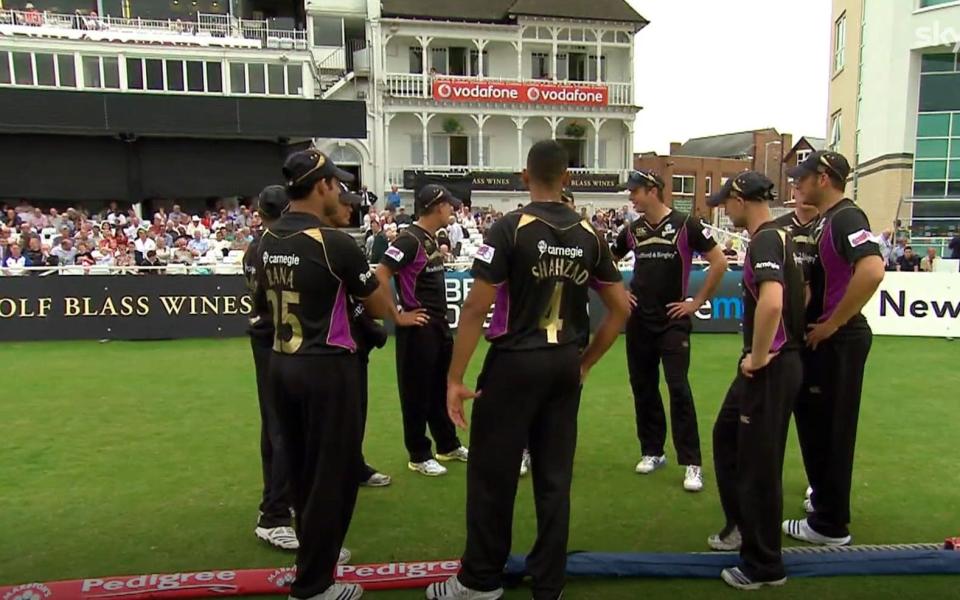
“It hurt hugely,” he says. “I think I had earned the right to get called down to Lord’s to be asked a few questions. To not be given that right, that opportunity to tell my story privately to a group of people, to talk honestly and openly? Surely, getting in a room and sorting it out would have been the most mature way to go about this business.”
Instead, the accuser and the accused wound up in a faceless conference room at the International Arbitration Centre, poring over every frame of the Sky footage in a bid to demonstrate whether Vaughan had said what Rafiq was claiming. In the most strained interludes, not least when the ECB’s lawyers scoured a series of crass tweets that he sent in 2010 to paint him as somebody who might have impugned Rafiq, Vaughan could scarcely believe what was happening to him.
“It was only 13 years ago that the ECB released a statement saying how I had been a great captain, a great ambassador for the game. I found it a horrible experience. I didn’t enjoy one minute of it. I looked around and I don’t think anyone else was enjoying it either. There were no whoops in that room. It all went far too far.”
Anger can be a waste of energy when it is left to fester. But Vaughan does not conceal his contempt for the disconnect between the ECB’s sloganising on mental health and its lack of care for those ensnared in the Rafiq row. “There are elements of this process that have been very cruel,” he says. “Not just cruel on me, but cruel on Azeem Rafiq, cruel on Adil Rashid, who was out playing for England in Bangladesh and put up on a screen at the hearing. Is that going to sort everything out? I don’t feel that the people making the decisions have had an ounce of interest in what this has been doing to people.
“In a few months’ time, it’s Mental Health Awareness Week, and guess what, the ECB will be all over it, campaigning for better pastoral care, whatever it may be. But actually, there have been a few people in the game going through really difficult times.” None have been so traumatised as John Blain, the Scottish player accused of calling Rafiq a “p---” in 2010 and 2011, allegations he vigorously denies. In a recent Telegraph interview, Blain acknowledged he was consumed with the notion of death, even wondering if his 12-year-old son was tall enough to carry his coffin.
“That hit me,” admits Vaughan. “I’ve not had those thoughts, but I can completely understand people who have been through this situation having thoughts as dark as John’s. I just hope someone’s looking after him. I’ve heard Azeem talk about suicide, and I hope someone’s looking after him. I really don’t feel that there are enough figures in the game who understand what people have gone through.”
'In terms of cricket there has been more support from Australia than from here in the UK'
So inadequate and inappropriate he says was the ECB’s handling of the Yorkshire affair, Vaughan has been on the brink of falling out of love with cricket altogether. He divulges that if the verdict had gone against him, he was considering decamping to the other side of the world.
“I’ve thought about moving to Australia. When you think about my time in English cricket, I feel I’ve given a half-decent service. But there has been more support from Australia than there has from here in the UK, in terms of cricket. The Australians haven’t taken any side. They haven’t said ‘we believe you’ or ‘we don’t believe you’. They’ve just been ringing regularly to ask, ‘Are you all right, mate?’ Sometimes, all you want is for people to check in on you.”
Vaughan is wary of sounding triumphalist about his exoneration. He is emollient about Rafiq, saying that he would be willing to meet him again. He also shows no sign of wanting to reach for the nearest bottle of champagne. He simply looks worn down by all the vitriol, all the lawyerly wrangling, all the questions about what type of future he and his family could plan beyond this nightmare.
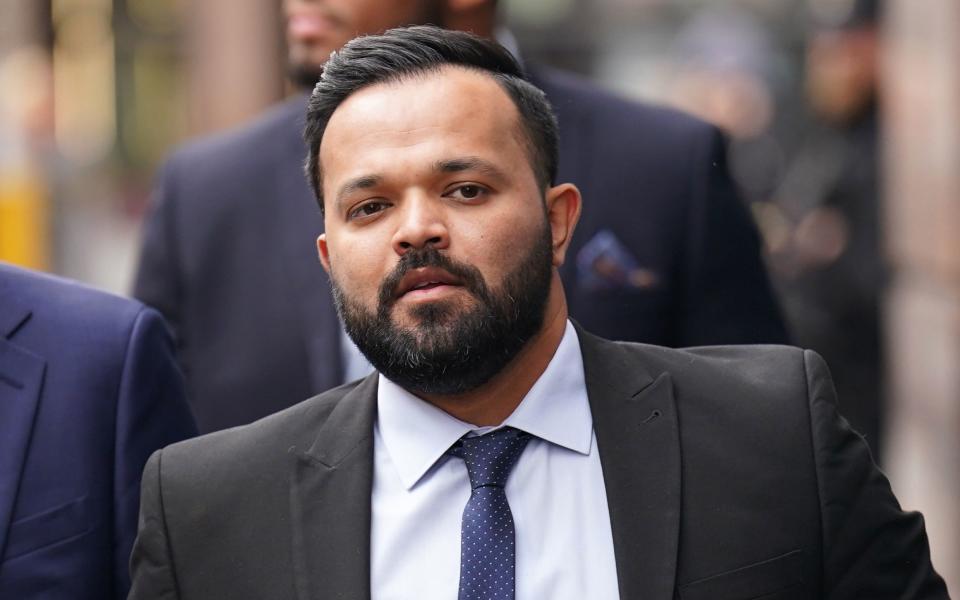
“I feel sad,” he says. “I haven’t won. I haven’t been ringing all my mates up today to say, ‘Yippee, I’ve won a court case.’ I just feel very sad that it has come to this. I don’t think there has been enough common sense, enough people asking themselves, ‘Are we doing this right?’ I hope those people at the ECB write down all the things that they’ve done badly and make sure that next time they don’t do it as badly again.”
'I would love to be a part of trying to make cricket a better place'
There is a financial dimension to consider here. Vaughan has carved out a lucrative post-playing career in the media, but even he has toiled to keep up with the mounting fees in taking his legal battle through to its final act. “I’ve lost a huge amount of money. Some people in cricket probably think I’m a guy who’s motivated by money. What this has taught me is that I’m not at all. I just couldn’t allow something to go unchallenged that I just do not recollect saying. It’s absolutely not that I don’t believe cricket has a problem. I think cricket has an issue, and we have to accept that, and I would love to be a part of trying to make cricket a better place.
“But to go through two years of this? I wouldn’t have been able to look myself in the mirror if I hadn’t taken it all the way. There have been many times when I’ve pondered pulling out. I’ve thought, ‘This is just a terrible look. Surely we’re not going to go through a public hearing like this, throwing mud at each other? Why don’t we all shake hands?’ But that handshake wasn’t possible. It never came.”
What has vexed Vaughan most is the sheer uncertainty. “Playing against Australia in 2005 was relatively straightforward compared to this,” he says, with a rueful smile. “At least I knew what was coming. I could understand that Glenn McGrath was going to bowl at me at 85mph, a belter around the top of off-stump. I just couldn’t plan for this. My life before had always been about certainty. But when you have no clue what the next month’s going to look like, or even the next week? I just hope I can look at the calendar for the next year and know that I’m going to be in those places.”
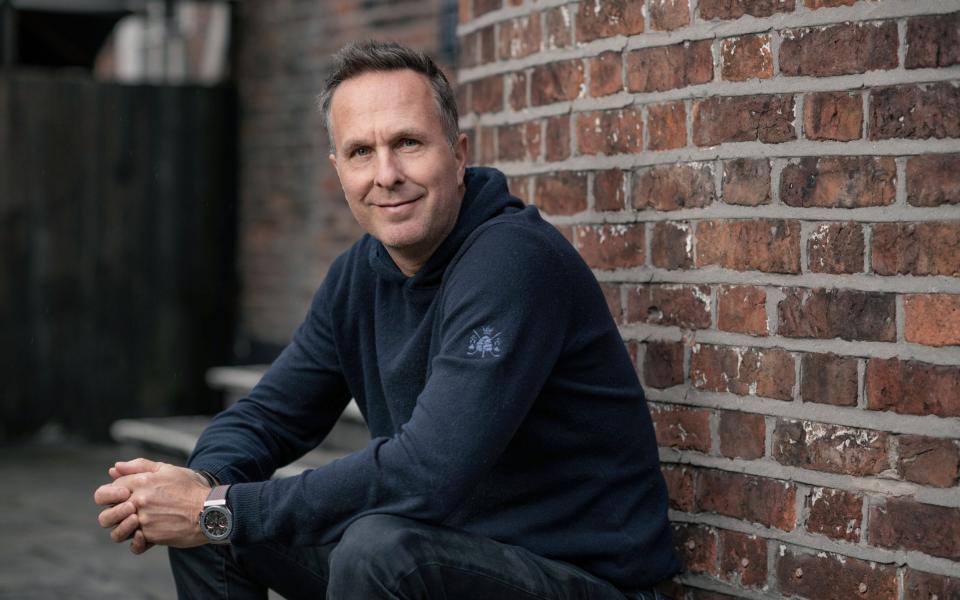
One imminent destination is Augusta, where he and a few friends will be for this week’s Masters. From there, he will head to the subcontinent to commentate on the Indian Premier League. By degrees, a semblance of optimism is returning. The healing is unlikely to be instantaneous.
“It’s not suddenly that I’m going to wake up and not think about this situation,” he concedes. “I think I’ll be going over it for a long, long time. I’m personally scarred. But I’m resilient.” For now, after so much chaos and anguish, Vaughan is keeping his greatest wish modest. “I just want my old life back.”

 Yahoo Sport
Yahoo Sport 





































